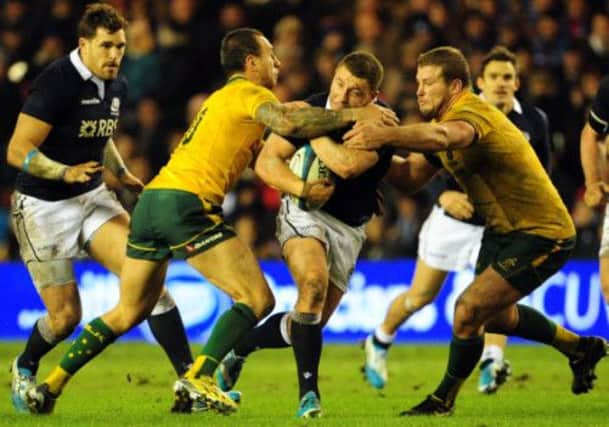Scotland v Australa: Weir’s way appeals


Where the match against South Africa was characterised by errors and a complete lack of shape on the few occasions when Scotland had the ball, yesterday the home side were tidy and structured. Though they rarely threatened to cut Australia to pieces, neither did they look a dead cert to shoot themselves in the foot.
While the blame for last week’s debacle certainly doesn’t rest with Ruaridh Jackson, nor did the stand-off do much to pen himself into Scott Johnson’s good books either that day. His first-minute missed touch resulted in the Springboks marching back up the pitch and scoring a try that was the springboard for a gruesomely one-sided win, and throughout the match the mercurial Aberdonian was found wanting under pressure. Against Japan he made three tries with his virtuosity, but against the Boks he was cruelly exposed and defined by errors rather than assists.
Advertisement
Hide AdAdvertisement
Hide AdSo it was no surprise that after winning 23 caps and with his 26th birthday approaching as fast as chances are running out, Jackson’s name was missing from yesterday’s starting line-up as Johnson sought to retrench. Nor was it a surprise that he turned to Duncan Weir, Jackson’s pugnacious 22-year-old rival and sparring partner at Glasgow.
Although their coach at Scotstoun, former Scotland and Lions stand-off Gregor Townsend, says that the two players are far more similar than most people appreciate, they are nevertheless fundamentally different beasts, as much divided by temperament as their physical gifts. Where Jackson stands flat and is more inclined to keep back rows occupied, Weir’s natural style is to stand deeper and employ the bludgeon of his boot more regularly than the rapier of his running game.
It’s not quite a straightforward Roundhead versus Cavalier scenario, Rob Andrew versus Stuart Barnes or Tony Ward against Ollie Campbell, but, as with Scotland during the Dan Parks era, the choice of which stand-off Johnson plumps for will help forge the personality of this side.
As the Scotland coach said after yesterday’s match: “Duncan used to stand right back in the pocket, and I’ve had to remind him that the only place for pockets is on trousers. But he did some good things today, and what I most liked about him was the way he attacked the line. He’s got a skill-set that’s made for Test rugby, and even if he was slightly naive in some aspects of his play it was a promising performance.”
Weir is a natural ball-player who, as a young footballer with Glasgow Athletic boys club, was the subject of interest from Celtic, Aberdeen, Kilmarnock and Dunfermline before he opted to concentrate on rugby, but yesterday it was his temperament that shone through. It would be unfair to say that he took a safety-first approach on a night when his pack won plenty of quality ball, but he did run the backline with a slickness and sure touch that at crucial times eluded Jackson last week. In defence he was as courageous and solid as his teammate – as he showed with a stonewall tackle on Mike Harris as the inside centre attacked Scotland’s line on a crashball move – but with the ball in hand he was less inclined to take the high-risk option.
There were, however, glitches in execution. As early as the seventh minute he missed touch, with Israel Folau, one of the best counter attackers from deep in the world, running the ball back and Australia setting up camp in Scotland’s 22, and it wasn’t the only time he kicked to Folau. But one of the most notable aspects of Weir’s personality is that he bounces back quickly from errors, and no sooner had Scotland won the ball back from that missed touch than the 5ft 8in stand-off atoned with a colossal touchfinder from a penalty which took Scotland from within their own 22 to just outside the Wallabies’ 22.
In attack Weir occasionally hinted at an ability to accelerate through small gaps, and demonstrated a willingness to take on defences. The highlight of half a dozen digs was an early break when Jim Hamilton committed the Wallaby defence just outside the Australian 22 and offloaded to Weir, who showed a clean pair of heels before being dragged down just short of the line.
If Weir’s distribution was also good, he will also be helped by the emergence of Matt Scott as a second five eighths-style player capable of acting as first receiver. When it comes to kicking for goal, Weir has a big boot but the degree to which it will be employed in Scotland’s cause in the near future is debatable after yesterday. When Greig Laidlaw thought a penalty was outside his range and handed the ball to Weir, the stand-off’s dismal penalty was worth about one out of ten, and that for effort rather than execution. He wasn’t handed the ball again.
Advertisement
Hide AdAdvertisement
Hide AdThat, though, may well change. Weir did enough yesterday on his eighth cap to suggest that he may well be given a longer run in this pivotal position, one which Scotland have struggled to satisfactorily fill since Craig Chalmers and Gregor Townsend hung up their boots.